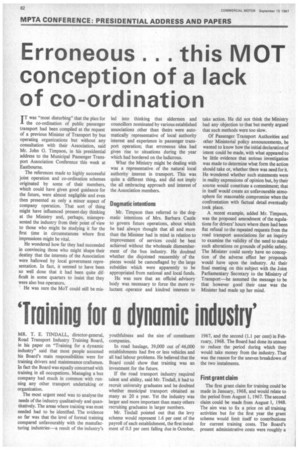Erroneous . . . this MOT conception of a lack of co-ordination
Page 84

If you've noticed an error in this article please click here to report it so we can fix it.
IT was "most disturbing" that the plan for the co-ordination of public passenger transport had been compiled at the request of a previous Minister of Transport by bus operating organizations but without any consultation with their Association, said Mr. John G. Timpson, in his presidential address to the Municipal Passenger Transport Association Conference this week at Eastbourne.
The references made to highly successful joint operation and co-ordination schemes originated by some of their members, which could have given good guidance for the future, were almost negligible and even then presented as only a minor aspect of company operation. That sort of thing might have influenced present-day thinking at the Ministry and, perhaps, misrepresented the industry from their point of view to those who might be studying it for the first time in circumstances where first impressions might be vital.
He wondered how far they had succeeded in convincing those who might shape their destiny that the interests of the Association were hallowed by local government representation. In fact, it seemed to have been so well done that it had been quite difficult in some quarters to insist that they were also bus operators.
He was sure the MoT could still be mis
led into thinking that aldermen and councillors nominated by various established associations other than theirs were automatically representative of local authority interest and experience in passenger transport operation; that erroneous idea had given rise to situations during the year which had bordered on the ludicrous.
What the Ministry might be dealing with was a representative of the natural local authority interest in transport. This was quite a different thing, and did not imply the all embracing approach and interest of the Association members.
Dogmatic intentions
Mr. Timpson then referred to the dogmatic intentions of Mrs. Barbara Castle to govern future operations, about which he had always thought that all and more than the Minister had in mind in relation to improvement of services could be best achieved without the wholesale dismemberment of the bus industry. He doubted whether the disjointed reassembly of the pieces would be camouflaged by the large subsidies which were apparently to be appropriated from national and local funds.
He was sure that an official advisory body was necessary to force the more reluctant operator and kindred interests to take action. He did not think the Ministry had any objection to that but merely argued that such methods were too slow.
Of Passenger Transport Authorities and other Ministerial policy announcements, he wanted to know how the initial declaration of intent could be made, with what appeared to be little evidence that serious investigation was made to determine what form the action should take or, whether there was need for it. He wondered whether such statements were in reality expressions of opinion but, by their source would constitute a commitment; that in itself would create an unfavourable atmosphere for reasonable compromise when the confrontation with factual detail eventually took place.
A recent example, added Mr. Timpson, was the proposed amendment of the regulations for drivers' hours where there had been flat refusal to the repeated requests from the road transport associations for an inquiry to examine the validity of the need to make such alterations on grounds of public safety. The Minister could surely have no conception of the adverse effect her proposals would have upon the industry. At their final meeting on this subject with the Joint Parliamentary Secretary to the Ministry of Transport—he assumed the message to be that however good their case was the Minister had made up her mind.




































































































































